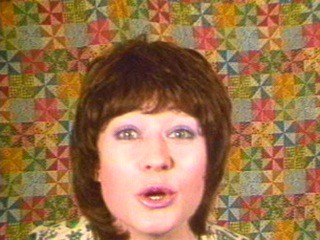An unseen viewer turns on a television to begin Made for TV with a greeting from The Morning Show host played by Ann Magnuson. The ten-minute video then delves into her portrayals of an array of female archetypes seen on a typical broadcast day. In this one-woman universe, Magnuson takes on nearly fifty stereotypes, including a screaming game show contestant, sensuous coffee drinker, noirish femme fatale, perky exercise instructor, and the bimbo star (Dodi Ditz) of a sitcom. She also plays Kimberly Crump, the stone-faced News at Noon anchor, and Tammy Jan, a Southern televangelist pleading for donations.
The scenes are punctuated by the static of channel hopping as well as recurring bits from commercials for the Dress Barn and various food products. Toward the end, the characters also become increasingly darker and the channels flip faster to eventually produce a cacophonous montage of wails and moans from a litany of characters. Finally, the viewer turns off the set and the credits roll, fittingly accompanied by the Star Spangled Banner. Like the anthem, Made For TV represents American culture, in particular the junky, popular aspects. Reduced to fit the dimensions of television, these fragments of information and fantasies have become just as, if not more, familiar than portrayals of “the land of the free and the home of the brave.”
Nonetheless, Made for TV is not necessarily looking down on these archetypes. As filmmaker Tom Rubnitz once said, “I wanted to make things beautiful, funny and positive—escapes that you could just get into and laugh through. That was really important to me.” Therefore, while Rubnitz and Magnuson skewer various female roles, they also celebrate them.
After moving from Chicago (where he was born in 1956) to Manhattan, Rubnitz created several other videos that simultaneously celebrate and parody pop culture and mass media entertainment. He became a quintessential New York underground film and video artiste. Most often associated with the East Village drag queen scene of the 1980s, Rubnitz produced short, humorous videos featuring some of New York’s most outrageous and talented musicians and artists.
The late John Sex, the B-52s, Quentin Crisp, and Lady Bunny are only a few of the stars in Rubnitz's oeuvre, which includes Wigstock: The Movie, a 1987 documentary about the annual drag queen festival. Shot nearly a decade before the feature-length documentary, the film presents Wigstock during its Tompkins Square Park era. Rubnitz also made Pickle Surprise (1989), a short, hilarious cooking demonstration, complete with a mantra, featuring Lady Bunny, Ann Magnuson, RuPaul, and others. The following year, for Summer of Love PSA (1990) Rubinitz worked with the B-52s to produce a "public service announcement" for the Art Against AIDS organization's "Summer of Love" project, which featured, among others, David Byrne, Allen Ginsburg, and Quentin Crisp.
His close friend, the actress, performance artist, and nightclub performer Ann Magnuson alternately has been called an ''East Village cult goddess,'' a ''guerrilla comedian,'' and a ''high priestess of low life.'' She was described by The New York Times as "an endearing theatrical chameleon who has as many characters at her fingertips as Lily Tomlin does.” Several of them are seen in Made for TV. Others include Salvador Dali's soulmate, Gala; Alice Tully Hall, a white gospel singer; and a vicious caricature of Prince's protégés known as Fallopia.
Born in January 1956 and raised in Charleston, West Virginia, Magnuson studied theater at Denison University in Ohio. After moving to New York City in the late 1970s, she spent her nights at CBGB or Max's Kansas City and began performing at Danceteria, Limelight, the Pyramid Club, and Club 57. Magnuson’s breakthrough came when Susan Seidelman cast her in a cameo role in Desperately Seeking Susan. She also acted opposite John Malkovich as the star of Making Mr. Right. From 1989 to 1992, Magnuson played obsessive magazine editor Catherine Hughes on the ABC sitcom Anything But Love. She also was the singer and lyricist for the seminal 1980s garage psych band Bongwater.
Magnuson’s film and television roles in Hollywood allowed her to continue producing avant-garde theatrical pieces in New York. In 1992, she opened one of her many one-woman shows, You Could Be Home Now, about her search for her roots in her hometown, at the Joseph Papp Public Theater. Magnuson debuted Rave Mom in 2001 at P.S. 122. An autobiographical show, the work details Magnuson’s downward spiral and personal search for peace in the aftermath of the deaths of several loved ones from AIDS, including her brother and Tom Rubnitz. –Kanitra Fletcher

